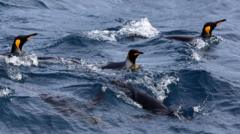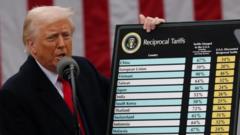The US decision to impose tariffs on the uninhabited Heard and McDonald islands, known for their unique wildlife, has sparked unexpected international reactions.
Tariffs on Uninhabited Islands: US Commerce Secretary's Defense Raises Eyebrows

Tariffs on Uninhabited Islands: US Commerce Secretary's Defense Raises Eyebrows
US government defends controversial tariffs on remote islands home to penguins and seals as a means to close shipping loopholes.
The US Commerce Secretary, Howard Lutnick, recently provided a defense for the imposed tariffs on the remote Heard and McDonald islands in the Australian Antarctic Territory, home to only penguins and seals. He explained that the measure aims to close what he described as "ridiculous loopholes," helping to prevent other nations from using these islands as a transit point for shipping goods into the United States.
The move caught Australian authorities off guard, with Trade Minister Don Farrell publicly labeling the decision a "mistake" and suggesting that it came from a "rushed process." During an interview, Lutnick noted the critical need for thorough enforcement: "If you leave anything off the list, countries will attempt to arbitrage America by routing through those nations," he said. He emphasized that the President was determined to ensure proper oversight.
This tariff announcement came amidst a tumultuous week for the US stock market, which saw all three major indexes plunge over 5%, marking the most significant decline since 2020. Roughly outlined, the implementation is seen as a measure to combat illegal shipping practices—something that transshipment methods can inadvertently facilitate. According to the Pew Charitable Trusts, hundreds of millions of dollars' worth of seafood is rumored to be illegally traded in the Pacific region annually due to such practices.
Data concerning exports from the Heard and McDonald islands to the US presents a challenging picture. Generally, the islands have only shipped minor exports in recent years. Strikingly, in 2022, the US imported products valued at $1.4 million from this territory, primarily categorized as unnamed machinery and electrical components.
Adding to the complexity of the situation is the inclusion of the British Indian Ocean territory, which is predominantly occupied by military personnel and requires permits for visitation. In 2022, it was reported that the territory managed to export approximately $414,350 to the US.
As global observers and analysts study this unexpected tariff measure, questions linger about the broader implications for international trade and wildlife conservation in these remote islands.
The move caught Australian authorities off guard, with Trade Minister Don Farrell publicly labeling the decision a "mistake" and suggesting that it came from a "rushed process." During an interview, Lutnick noted the critical need for thorough enforcement: "If you leave anything off the list, countries will attempt to arbitrage America by routing through those nations," he said. He emphasized that the President was determined to ensure proper oversight.
This tariff announcement came amidst a tumultuous week for the US stock market, which saw all three major indexes plunge over 5%, marking the most significant decline since 2020. Roughly outlined, the implementation is seen as a measure to combat illegal shipping practices—something that transshipment methods can inadvertently facilitate. According to the Pew Charitable Trusts, hundreds of millions of dollars' worth of seafood is rumored to be illegally traded in the Pacific region annually due to such practices.
Data concerning exports from the Heard and McDonald islands to the US presents a challenging picture. Generally, the islands have only shipped minor exports in recent years. Strikingly, in 2022, the US imported products valued at $1.4 million from this territory, primarily categorized as unnamed machinery and electrical components.
Adding to the complexity of the situation is the inclusion of the British Indian Ocean territory, which is predominantly occupied by military personnel and requires permits for visitation. In 2022, it was reported that the territory managed to export approximately $414,350 to the US.
As global observers and analysts study this unexpected tariff measure, questions linger about the broader implications for international trade and wildlife conservation in these remote islands.




















